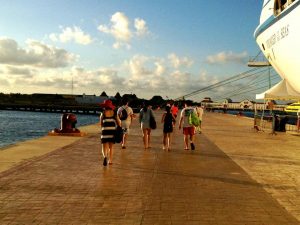When I was 9 or 10 years old, I went to Jamaica with my family over Thanksgiving break. For me, it was a vacation despite the volunteer dental work my mom and dad were helping with in a clinic a colleague of my mom’s had set up on his own. While on this trip, I noticed the effect of foreigners and tourism in another country. While our group treated the locals with respect and genuinely tried to help the community, we were targeted by people accustomed to tourists during our two days break at the end of the trip. Driving through Kingston, Jamaica, so many stores, restaurants, and other vendors were geared towards the Americans passing through to swim at the beaches or hike through jungles. In hindsight, I realize that the clinic had a limited capacity to help, and while it doesn’t have the other hallmarks of voluntourism, such as high fees and short trips of different people, it’s short-sighted work doesn’t do much more good than the voluntourist programs.
When I was 16, my family went on a cruise to celebrate my grandparents’ 50th anniversary. We went around the Caribbean, and tourism essentially made these towns. We were confined to designated tourism zones, and the artificial nature of the crafted experience was glaringly obvious. I believe the local government determined this, but nonetheless it feels wrong to be in a place designed for your money. There was no cultural exchange, no genuine interaction. Even within properly designed tourism, I think that there’s two types: one that acknowledges the majority of tourist desires to have fun and enjoy, and the other that teaches and shares culture.
After going to El Rosario, Honduras, I know that I have good intentions for this journey. I’m not expecting a vacation, I’m not creating a fantasy of a Central American expedition, and I’m hoping to have genuine interactions with the Nicaraguan people. Unlike my first international experience in Jamaica, Bridges to Community and the CCESP aims for a lasting development impact rather than an “in-the-moment” treatment, doing more than voluntourist organizations. Despite all this, my other-ness will always be physically present as a barrier to real interaction. I will try to surpass differences by checking my privilege and foreignness, withholding my cultural norms of right and wrong, and learning about Nicaragua through their eyes.
